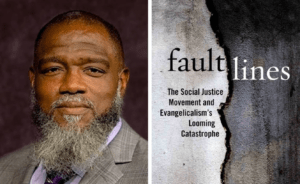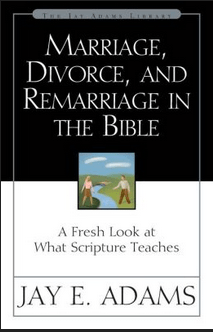by Voddie T. Baucham, Jr.
I have long been a fan of Dr. Baucham, having found him to be a clear thinker and a truth warrior. Since I have been deeply troubled by evangelicalism’s embracing of the presuppositions and conclusions connected to critical race theory and intersectionality during the past year, when I discovered that Dr. Baucham wrote a book addressing these hot topics, I was eager to read it. He did not disappoint.
The author clearly articulates the gravity of our situation in society and the church. In his own words:
The current moment is akin to two people standing on either side of a major fault line just before it shifts. When the shift comes, the ground will open up, a divide that was once invisible will become visible, and the two will find themselves on opposite sides of it. That is what is happening in our day. In some cases, the divide is happening already. Churches are splitting over this issue. Major ministries are losing donors, staff, and leadership. Denominations are in turmoil. Seminary faculties are divided with some professors being fired or “asked to leave.” Families are at odds. Marriages are on the rocks. And I don’t believe the fracture in this fault line is yet even a fraction of what it will be. (Kindle, pp.6-7)
Baucham describes the errors of critical race theory and shows how and why well-intentioned evangelicals fall prey to these arguments.
The problem is not ethnic tension, but the fundamental assumptions that drive our assessment of and subsequent approaches to it. (Kindle, p.4)
Baucham goes on to write:
Those belonging to the social-justice crowd present themselves as the only ones pursuing justice, to the exclusion of all who disagree with their assessments— who, by that definition, are pursuing injustice. Perhaps the most troubling aspect of the current struggle is that it mischaracterizes Christians that way too. On one side are “compassionate” Christians who are “concerned about justice.” On the other are “insensitive” Christians who are “not concerned about justice.” This is wrong. I have pursued justice my entire Christian life. Yet I am about as “anti– social justice” as they come— not because I have abandoned my obligation to “strive for peace with everyone, and for the holiness without which no one will see the Lord” (Hebrews 12: 14), but because I believe the current concept of social justice is incompatible with biblical Christianity. This is the main fault line at the root of the current debate— the epicenter of the Big One that, when it finally shifts with all its force, threatens to split evangelicalism right down the middle. Our problem is a lack of clarity and charity in our debate over the place, priority, practice, and definition of justice. (Kindle, p.5, underlining mine…)
Baucham states that the antiracist movement is a false religion with its own cosmology or narrative of beginnings, a new version of original sin (racism), a new law (the work of antiracism), a new priesthood (non-white people), a new form of revelation (what Baucham calls “ethnic gnosticism” – special knowledge conferred on minorities), a new version of truth (narrative), a new extra-biblical canon of sacred writings (approved reading lists of CRT/I books and articles), and a new way to be saved (unending repentance and reparations).
In case you’re wondering about its soteriology, there isn’t one. Antiracism offers no salvation— only perpetual penance in an effort to battle an incurable disease. (Kindle, p.67)
“Without confession to the sin of white racism, white supremacy, white privilege,” contends Sojourners magazine founder Jim Wallis, “people who call themselves white Christians will never be free… from the bondage of a lie, a myth, an ideology, and an idol.” 23 This sentiment is an affront to the Gospel. “For the law of the Spirit of life has set you free in Christ Jesus from the law of sin and death” (Romans 8: 2, italics mine). And again, “So if the Son sets you free, you will be free indeed” (John 8: 36, italics mine). But this is the gospel of antiracism, where there is no freedom— at least, not for white people. (Kindle, p.77)
Baucham counters the false claims of CRT/I with truth coming from secular sources and his biblical perspective. He also illuminates the logical fallacies CRT/I debaters use. Anyone who reads this book with an open mind should come away convinced that we are in the midst of a tremendously critical fight for the integrity of the gospel, the truth of the Bible, and the existence of our nation.
The author reveals that the principles of CRT were first developed by members of the socialist Frankfurt School in an attempt to re-package communist / socialist principles in a more appealing format for those living in Western democracies. Communism had not been able to gain traction in Western nations because of our strong middle class. There was not a sufficient divide between the haves and have nots. Some other way to divide and conquer was needed, which led to the adoption of the principles of CRT/I. Rather than pitting the proletariat against the bourgeois, CRT/I identifies all white people as racist oppressors and seeks to divide people of color against them.
The demonic cleverness of the CRT/I position is that it sets itself up to be the sole arbiter of truth. In Baucham’s words, the critical social justice view is both “unfalsifiable and unassailable.” (p.155)
If black people know racism, and white people cannot know racism (and are racist by default as a result of their white privilege), then the only acceptable response is for white people to sit down, shut up, and listen to what black people have to say on the matter. (Kindle, p.103)
…the idea that there is special knowledge or revelation available to some and hidden from others by virtue of their race or position in the oppressor/ oppressed scheme is unthinkable— and unbiblical. (p.111)
Baucham points out that antiracism tenets offer no hope for salvation for oppressors.
White people are not called to look to God for forgiveness. They are not told that Christ’s blood is sufficient. No, they are told that they must do the unending work of antiracism. And this work must be done regardless of their own actions since the issue at hand is a matter of communal, generational guilt based on ethnicity. (p.129)
The author also makes a strong argument that CRT ignores a large body of evidence that supports other reasons for the plight of the black community apart from systemic racism.
Chapter Nine addresses what to me was an extremely disturbing development just prior to the recent election when several prominent evangelical leaders used CRT arguments to back candidate Biden against Trump. To offset the claim that was made that Christians should not vote for Trump because Democrats were stronger across the board on human rights issues, Baucham writes:
Whether it is Platt, Dever, Wallis, Seitz, Keller, Pro-Life Evangelicals for Biden, or Pope Francis, my big problem with this entire line of argumentation is that “single-issue voting” is a straw man. I am not, nor have I ever met, a single-issue voter. Issues like same-sex marriage, school choice, and religious freedom, to name a few, are all very serious issues to Christian voters. And these voters are more than narrow-minded fundamentalists being led around by the nose for the sake of a single issue. Moreover, this line of argumentation makes light of the vast chasm between the platforms of the two parties on major moral issues while extoling the virtues of sophisticated black voters who carefully weigh important (yet unnamed) issues that white voters apparently do not comprehend. (Kindle, pp.189-90)
When I read that the eminent John Piper came to the conclusion that President Trump’s moral deficiencies and behavioral lapses were more serious in God’s eyes than murdering the unborn, I realized that people I formerly trusted and respected had crossed over into error, having been duped by unbiblical social justice arguments. For me it was a sad day indeed. Baucham goes on to write:
However, even if abortion were an example of single-issue voting, I reject the idea that murdering the unborn can be subjugated in favor of social issues that are being promoted through the lens of Critical Social Justice. (Kindle, p.190)
Baucham concludes by making a plea to the church.
This book is, among many things, a plea to the Church. I believe we are being duped by an ideology bent on our demise. This ideology has used our guilt and shame over America’s past, our love for the brethren, and our good and godly desire for reconciliation and justice as a means through which to introduce destructive heresies. (p.204)
Racism is real. Injustice is real. No matter how many times I say those things, I still will be accused of turning a blind eye to them— not because I deny them, but because I deny the CRT/ I view that they are “normal” and at the basis of everything. But there is another way of seeing. “The history of the USA is neither purely wicked and racist, nor perfect,” writes Thomas Sowell. “Correlation is not causation, disparity is not necessarily discrimination. Complex problems require complex solutions.… To make racism the driving force behind slavery is to make a historically recent factor the cause of an institution which originated thousands of years earlier.” (p.222)
Baucham adds:
Black Lives Matter is a Trojan horse. The movement has a name that Christians find attractive because we love God and our neighbor and have a desire to see justice done. (p.222)
He wrote that “for many white Christians, it is the opportunity to assuage their guilt.” (p.222)
I have heard a mantra lately that rings hollow in my ears: “There can be no reconciliation without justice.” When I hear that, I want to scream, “YES! AND THE DEATH OF CHRIST IS THAT JUSTICE!” All other justice is proximate and insufficient. It is because of Christ’s work on the cross that that we can heed the apostle’s admonition: “Let all bitterness and wrath and anger and clamor and slander be put away from you, along with all malice. Be kind to one another, tenderhearted, forgiving one another, as God in Christ forgave you” (Ephesians 4: 31– 32). Who am I to tell a white brother that he cannot be reconciled to me until he has drudged up all of the racial sins of his and his ancestors’ past and made proper restitution? Christ has atoned for sin! Consequently, the most powerful weapon in our arsenal is not calling for reparations: it is forgiveness. Antiracism knows nothing of forgiveness because it knows nothing of the Gospel. Instead, antiracism offers endless penance, judgment, and fear. (p.229 – underlining is mine)
Thanks to Voddie Baucham for writing this much needed book. I hope this summary whets your appetite to read it carefully in its entirety.




